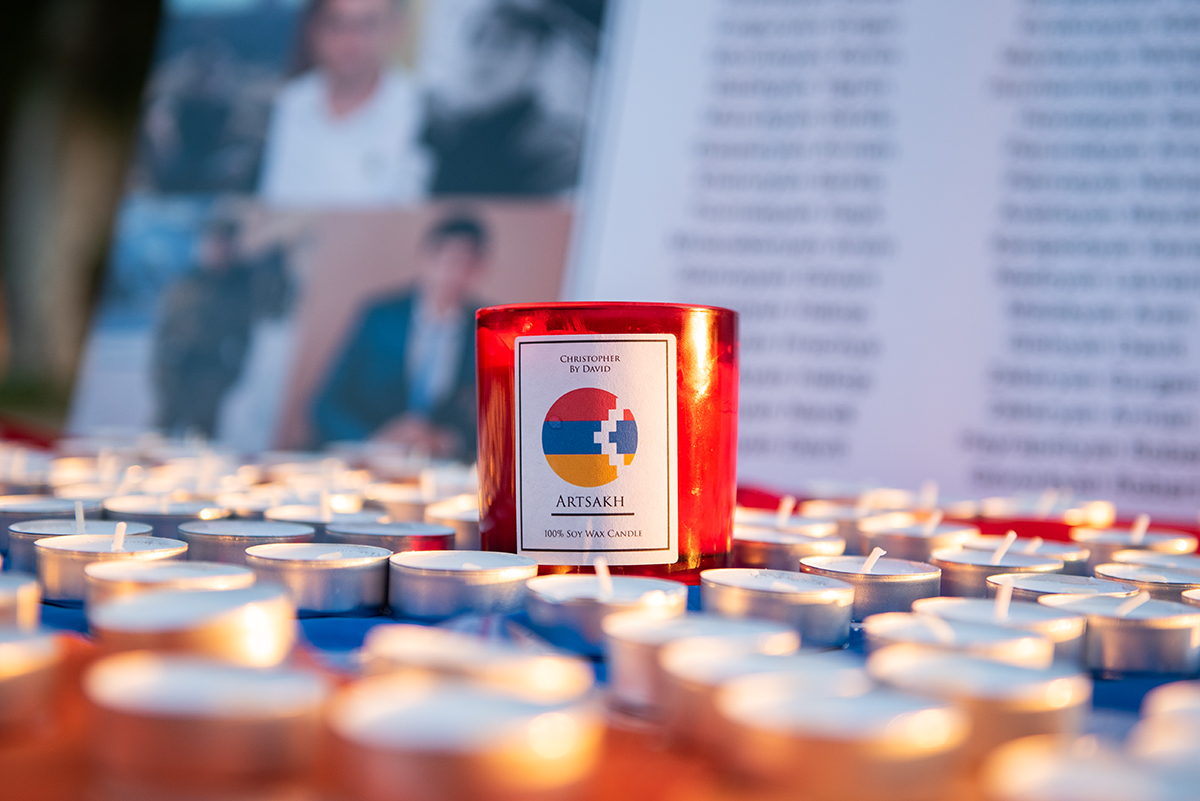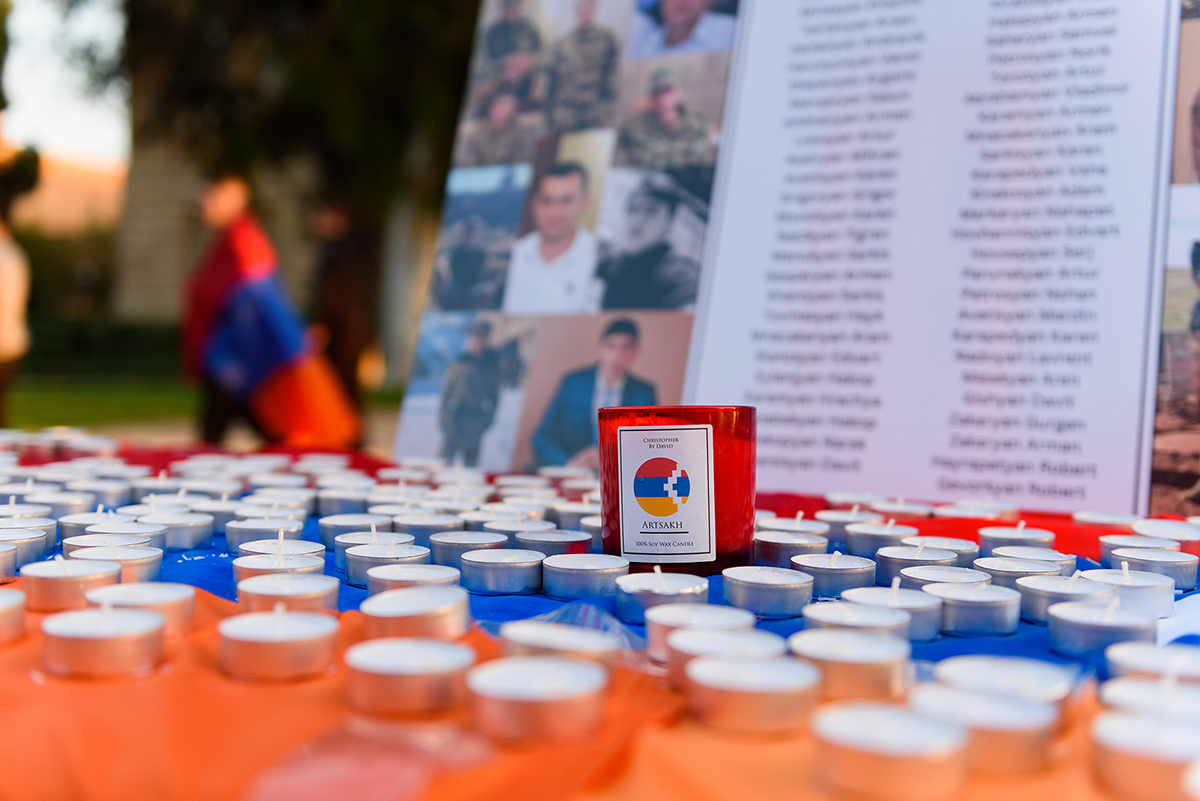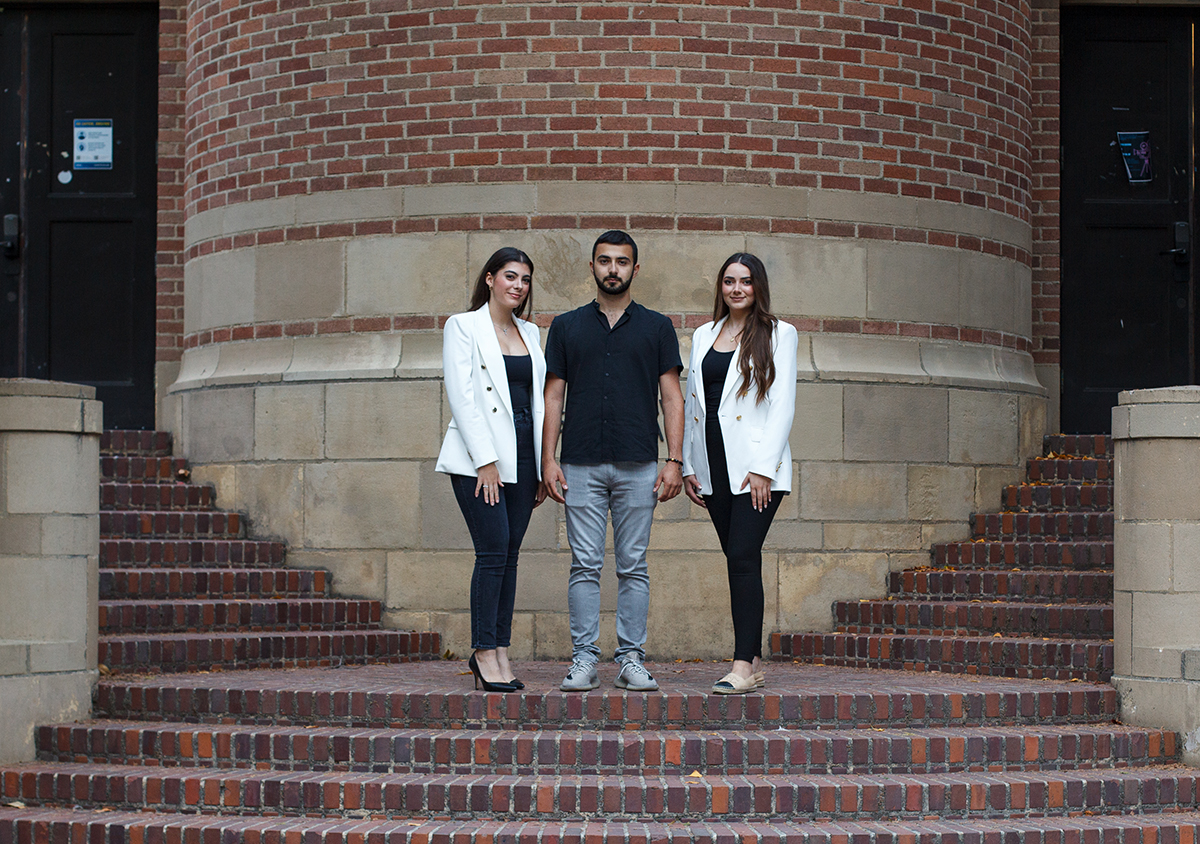Bruins voice concern about barred Lachin Corridor’s impacts on human welfare

A candle labeled with the word “Artsakh” is pictured. The Lachin Corridor in Nagorno-Karabakh, also known as Artsakh by Armenians, became blocked in December. (Christine Kao/Daily Bruin staff)
By Sarah Nalbandian
Feb. 26, 2023 11:02 p.m.
UCLA community members expressed concern for people lacking basic needs in the Nagorno-Karabakh region near Armenia because of restricted access to the area.
On Dec. 12, the Lachin Corridor in Nagorno-Karabakh – which is also called Artsakh by Armenians – became blocked. Azerbaijan blamed protests against illegal mining by Armenians in the region, while United States officials believe the blockade is likely caused by the Azerbaijani government, according to the Los Angeles Times.
Secretary of State Antony Blinken urged the Azerbaijani government to open up commercial traffic to the region in late January. According to Human Rights Watch, although Russian peacekeeping forces are delivering essential goods and critically ill patients transferred by the Red Cross to Armenia are being allowed in and out of the area, regular traffic is blocked and many needs remain unmet.
The Lachin Corridor in Nagorno-Karabakh is the only land link between the territory and Armenia, according to the LA Times. Azerbaijan and Armenia have disputed control over the Nagorno-Karabakh territories since the 1980s, and the region is home to many ethnic Armenians.
Peter Cowe, Narekatsi Professor of Armenian Studies at UCLA, said Azerbaijani protestors associated with ecological issues have closed the Lachin Corridor between Nagorno-Karabakh and the rest of Armenia. This has complicated any transportation between the two regions, he added.
“You think immediately of the dire situation with regard to medical care. The medical facilities in Nagorno-Karabakh are not of very, very high standard,” Cowe said. “Patients requiring urgent care would normally, of course, be moved to the hospitals in Yerevan for immediate treatment. And this, of course, is not possible just now.”
Several U.S. representatives have also claimed that the Azerbaijani government is blocking resources to the region, causing devastating effects. Since the roadblock began over 70 days ago, residents have been left with limited access to food or electricity and many have been cut off from gas in the middle of winter, according to the LA Times.
Angela Minasyan, a fourth-year psychobiology student and president of the Armenian Students’ Association at UCLA, said the region has been critically isolated from the world since the blockade began, noting that there are voices in the international community who have also issued strong concerns about the conflict in the region.
On Dec. 15, the Lemkin Insitute for Genocide Prevention released a Red Flag Alert for Genocide in regard to the blockade, calling on the international community to condemn Azerbaijan’s actions. On Wednesday, the International Court of Justice also released a statement demanding the Republic of Azerbaijan open the Lachin Corridor.
“What we’re working on recently is a resolution that we would want to submit to ASUCLA (Associated Students UCLA) in terms of having collaborators within ASUCLA advocate for the Armenian cause,” Minasyan said. “This resolution is currently being worked on, and we’re really, really hoping to have the support of ASUCLA and eventually have the support of faculty and staff that lead UCLA.”
Minasyan added that the university community can support their Armenian peers by speaking out and advocating for awareness to allow the broader public and the U.S. government to take action.
The All-Armenian Student Association, a federation of U.S. college Armenian student associations promoting students’ connection to Armenian cultural heritage, also released an open letter at the beginning of January condemning violence from Azerbaijani forces toward Armenians in the Nagorno-Karabakh region.
UCLA ASA is currently also working with the Hidden Road Initiative – a nonprofit organization that aims to provide educational opportunities for students who live in villages in Armenia – to connect students and teachers from Nagorno-Karabakh through a virtual forum called Artsakh Talks. Each week, one teacher and one student share their testimonies and their personal experiences regarding the current situation, Minasyan said.
Talking with these students and connecting the diaspora is one way to motivate and encourage them to stay hopeful, Minasyan said.
As a way to support the citizens of Artsakh, UCLA ASA also created a fundraising campaign that raised around $600 for support toward education in Armenia during the blockade.
The money was used to purchase blackboards for students in the village of Poghosagomer, Minasyan said, adding that students are unable to attend school because of the Lachin Corridor blockade.
Tigran Vartanyan, the owner of a vacation tour company in the region, said he feels the situation not only affects the lives of the people in Artsakh but of those in Armenia as well.
Vartanyan said he is now unable to take tourists through Artsakh because of the blockade, which will have a long-term effect on his business, adding that many other people, such as those running taxi services to and from the region, have also lost income.
Vartanyan said he feels that if the situation can get more news coverage, things may improve. He added he hopes that this blockade is lifted soon to prevent any more consequences for family and friends.
The primary issue as of right now involves emphasizing the need for tangible action, Cowe said. It is necessary to come to an agreement on the issue to allow communication between the two regions, he added.
Minasyan said she believes bringing attention to these problems can help prevent further issues in the region.
“This Lachin Corridor situation needs to be fixed,” Minasyan said. “Right now, it’s (Nagorno-Karabakh) literally an island in a sea of mountains. There’s no access out of there, so it’s a really scary situation.”




